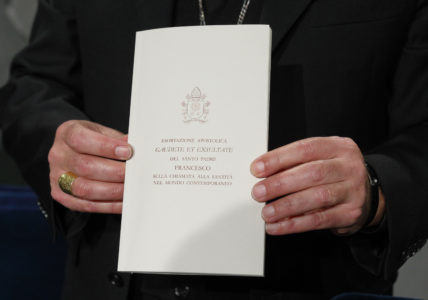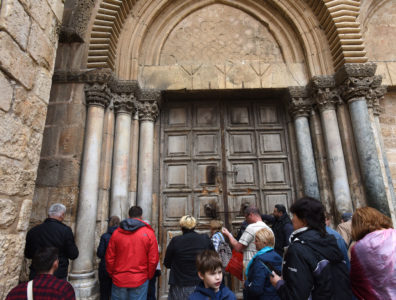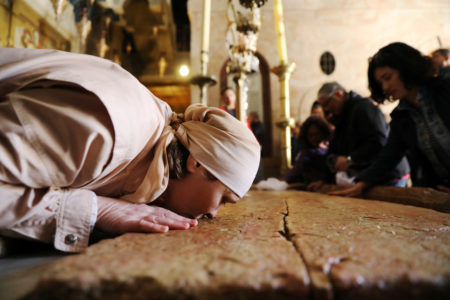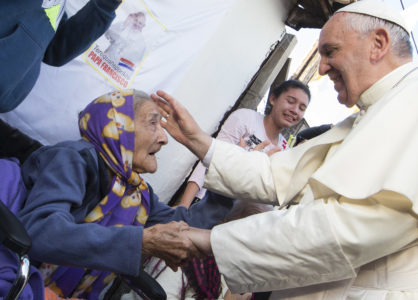By Kelly Sankowski
WASHINGTON (CNS) – Surrounding the 1968 release of “Humanae Vitae” (“Of Human Life”) was the cultural context of the sexual revolution and a widespread fear about overpopulation following World War II, said Donald Critchlow, a professor of history at Arizona State University.
At the time, there were movements in support of eugenics, abortion rights and sterilizations in an attempt to curb population growth, Critchlow told an audience at The Catholic University of America April 5.
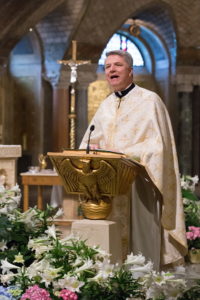
Father Mark Morozowich, dean of theology and religious studies at The Catholic University of America in Washington, delivers the homily April 6 in the Crypt Church at the Basilica of the National Shrine of the Immaculate Conception in Washington. It was the closing Mass of a symposium marking the 50th anniversary of Blessed Paul VI’s encyclical “Humanae Vitae.” (CNS photo/courtesy The Catholic University of America)
Those who thought voluntary family planning was not enough proposed other, more coercive ideas, such as requiring couples to get a license to have a child or requiring sterilization for couples with more than five children, he added.
Critchlow was one of several speakers at a 50th anniversary symposium on Blessed Paul VI’s encyclical “Humanae Vitae” April 4-6 hosted by Catholic University. Keynotes and a number of workshop sessions examined the teaching and legacy of the document on the regulation of birth issued July 25, 1968.
In a session exploring the historical context of the times when the encyclical was released, Critchlow noted that prior to the drafting of “Humanae Vitae,” a commission was appointed to give suggestions for the Catholic Church’s response to new forms of contraception.
The majority of the people on the commission recommended that the use of the birth control pill should be accepted and church teaching on the subject should be changed.
Blessed Paul rejected the commission’s report and in “Humanae Vitae” affirmed the church’s teaching on the sanctity of human life and its opposition to artificial contraception. In the document, the pope warned of the harm that widespread use of contraception would cause in society, such as lowering of moral standards, marital infidelity, less respect for women, and the government’s ability to use different methods to regulate life and death.
Critchlow said many priests and laypeople, particularly in the United States, dissented from this teaching. Students and faculty went on strike at The Catholic University of America after the board of trustees denied the tenure of a professor, Father Charles E. Curran, who publicly disagreed with the encyclical’s teaching. Cardinal Patrick O’Boyle disciplined 39 priests in the Archdiocese of Washington for their dissent from the document. Thousands of scientists wrote a petition published in The New York Times that criticized the encyclical.
Throughout the anniversary symposium, people continually praised the prophetic message of the document, which still “stands as a profound and affirmative” defense of traditional values and family life, said Critchlow.
“In the end, what ‘Humanae Vitae’ proved was to be prophetic in its warnings of the breakdown of family and the depersonalization of sexual acts we see today in America,” Critchlow added.
Noting Pope Francis’s call to be in touch with realities people are facing in their daily lives, Mary Eberstadt, an author and speaker on issues of American culture, spoke about how the sexual revolution and the teachings of “Humanae Vitae” fit into that reality.
“The promise for sex on demand without restraint may be the biggest temptation humanity has been faced with,” she said.
In the face of that temptation, the teachings of “Humanae Vitae” are difficult, “but to confuse hard (teachings) with wrong is an elementary error,” said Eberstadt.
“If we are truly to lean into reality as Pope Francis has asked us to do … there is only one conclusion … the most globally reviled and widely misunderstood document … is also the most explanatory and prophetic of our era,” she added.
While many proponents of contraception support it as a way to reduce the number of abortions, Eberstadt said it is now “clear beyond a reasonable doubt that contraception also led to an increase in abortion,” as rates of out-of-wedlock births exploded at the same time that people were increasingly using modern contraceptive methods.
When the availability of abortion made the birth of a child “a physical choice of the mother,” it also made fatherhood a social choice for the father, who no longer felt equally responsible for the out-of-wedlock birth, said Eberstadt.
As an example of how the sexual revolution and widespread use of contraception benefited men more than women, Eberstadt pointed to the recent “Me Too” movement where women have been sharing stories of sexual harassment in the workplace. These stories show how “widespread contraception licensed predation,” she said.

